This summer, Michigan State University’s Ethics Institute co-hosted the Generative AI Ethics Module Design Sprint Workshops with the Center for Teaching and Learning Innovation and the Evidence-Driven Learning Innovation research center. The event was funded by the National Science Foundation’s Responsible Design, Development and Deployment of Technology program.
The three-day program included opportunities to engage with expert speakers, participate in hands-on sessions and network with STEM educators. Attendees represented 50 universities and 41 disciplines, with more than 60 participants both online and in person.
After an introduction and goal-setting session on the first day, participants heard from Kirk Hanson, a senior fellow at the Markkula Center for Applied Ethics at Santa Clara University and former executive director of the center.
“The first session gave me a historical context of ethics that I have never been exposed to,” said Lucy Arellano, associate professor at University of California, Santa Barbara. “Through master's work and doctoral work, never has it been presented to me in that way.”
Hanson emphasized how ethics translates into other areas of life, including unavoidable ethical dilemmas that are relatable for educators.
Following lunch, Brenna Clarke Gray, the Educational Technologies Coordinator at Thompson Rivers University in British Columbia, Canada led a session focused on assessing risk and reducing harm with generative AI in education. The day concluded with time for participants to plan a teaching module and begin developing an instructional activity.
Day two started with a peer review of the modules created on day one. Later, Chris Gilliard, co-director of the Critical Internet Studies Institute, presented on the intersections of surveillance, data privacy, race and class in relation to generative AI. Then, MSU faculty and staff led a panel discussion on AI bias that was facilitated by Bree Holtz. She serves as a professor in the Department of Advertising & Public Relations at the College of Communication Arts and Sciences and as director of MSU’s Ethics Institute.
Panel participants included Mohammad Ghassemi, assistant professor in the Department of Computer Science and Engineering; Anjana Susarla, Omura-Saxena Professor of Responsible AI in the Eli Broad College of Business; Danielle DeVoss, interim chairperson and William J. Beal Distinguished Professor in the Department of Writing, Rhetoric and American Cultures in the College of Arts and Letters; and Hala Sun, associate director of assessment and evaluation at EDLI in the College of Natural Science and the Eli Broad College of Business. Sun is also the principal investigator of the NSF grant that funded the series.
The final day opened with a session by Jeremy Van Hof, teaching center director for CTLI at MSU, who focused on academic integrity in the age of generative AI Participants then worked in groups to reflect on the topic and emphasize policies. They concluded the day with additional module work, group discussions and report-outs, and networking.
In addition to hearing from knowledgeable educators, attendees had the chance to collaborate and learn from their peers and apply concepts to hands-on activities. The resulting work helped them understand how to integrate AI into their courses.
Amitava Karamaker, a professor in the College of Science at University of Wisconsin-Stout, said, "AI is a new and emerging trend and as an educator I wanted to be cognizant about what's going on and how I can incorporate Gen AI, essentially AI in general, in my teaching."
The workshop also brought up important questions for AI in the university classroom and discussion around the future of AI Arellano shared that her experiences with AI in the classroom motivated her to attend. As we look toward what’s next, she sees many parallels between the implementation and use of the internet and how we approach AI.
Arellano said, “Given what we went through when the internet was introduced, what can we predict will happen if history repeats itself? And as a faculty member, how can I be more intentional in learning how my students are using AI and how can I capitalize on their usage to increase their learning in my courses?”
